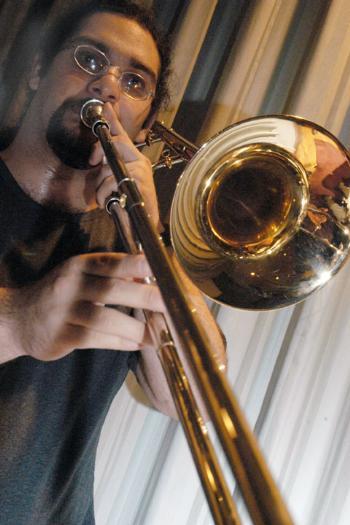
News
Summers Will Not Finish Semester of Teaching as Harvard Investigates Epstein Ties

News
Harvard College Students Report Favoring Divestment from Israel in HUA Survey

News
‘He Should Resign’: Harvard Undergrads Take Hard Line Against Summers Over Epstein Scandal

News
Harvard To Launch New Investigation Into Epstein’s Ties to Summers, Other University Affiliates

News
Harvard Students To Vote on Divestment From Israel in Inaugural HUA Election Survey
Spotlight: BRETT WORTZMAN ’06

What is your assessment of Harvard’s artistic community and culture? Do you feel this is true of other artistic endeavors at Harvard?
Music performance at Harvard certainly seems to be mostly extracurricular, but that doesn’t take anything away from it. There are so many performance opportunities on campus—between all the orchestras, the Band and Jazz Bands, musicals, small groups—that pretty much anyone can find a place to play.
What do you find rewarding about performing? What inspires you, as a busy college student, to continue to participate in an art that requires such intense practice?
Music for me is a lot about personal expression—not just playing, but listening as well. I tend to really get into the music, and I find that making good music can be a soothing experience after a stressful day or week. It’s also a great way to meet other people you might not have met otherwise. My roommates and I are concentrating in computer science, physics, engineering, history, and social studies, but we’re all brought together by our music.
What has been your most fulfilling artistic/academic experience?
One of the things I’ve most enjoyed about being in the Band here is the opportunity to arrange our own music. It was a new experience for me, creating my own versions of popular music and hearing it played in front of large crowds at football and hockey games, and I’ve found it really rewarding.
How have your years at Harvard affected you or your performance art?
Like everyone else, I’ve had a lot more to do here than I did in high school, and so my musical skills have suffered a bit. But at the same time, I’ve been able to work with so many great musicians that it’s helped me find a place as a player. I think I’ve become more of a “musician” even if my talent level isn’t quite what it once was.
Characterize yourself or your taste in arts projects and music in five words.
Purist, energetic, old-fashioned, eclectic, ambitious.
Where do you imagine yourself next year, post-graduation, and in ten years?
Next year, I figure myself to be more or less right back here, involved in the Band and Jazz Bands, and doing CS work to no end! After graduation and in ten years, though, I have no idea—hopefully working some kind of computer-related job while still playing on the side.
Then again, who knows?
Do you feel at all drained after performing a personal piece? What does performing require?
Performing for me is all about the music. There’s the obvious necessity to prepare the music technically—to be able to play the notes on the page; but I’ve always felt that there’s a lot more to it than that. I think that performance should be less about preparing the technical aspects of the piece and more about getting in touch with and developing a connection with the music you’re performing. It’s my belief that you can’t truly perform music you don’t understand.
The Harvard Sunday Jazz Band seems to play from a broad repertoire, even playing swing music at this weekend’s performance. With the set of instruments used in your jazz band, what is your favorite type of genre to play?
Straight-up, old-fashioned jazz is definitely my favorite, like the kind of music we’ll be playing Friday night. I also really enjoy playing Latin jazz and funk with the Sunday band, and we try to mix some of that in when we do dances. We sometimes try some more interesting things too—more progressive or contemporary jazz, jazz-rock, fusion—but my favorite is still good old swing!!
—Vinita M. Alexander
Want to keep up with breaking news? Subscribe to our email newsletter.
